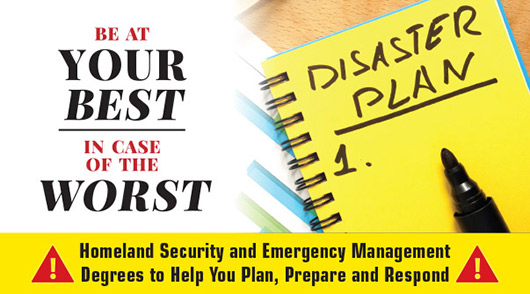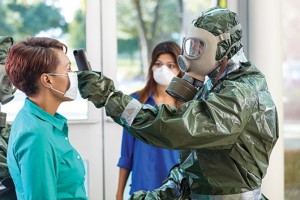
On New Year’s Day, as millions of viewers tuned in to watch the Rose Parade, what they didn’t see on camera was the increased presence of law enforcement along the route, with explosives-detection and tactical teams standing ready to respond to any terrorism event. Assessing risks for such potential attacks and planning strategic responses are key skills taught in homeland security degree programs.

After the December 2015 mass shootings in San Bernardino, California, homeland security officials stepped up protective measures for the January 1 Rose Parade in nearby Pasadena.
Of course, law enforcement professionals aren’t only called upon for human-made events. Natural disasters, such as the widespread flooding this past winter, also demand specialized training to spearhead rescue operations, develop response policies and help first responders cope with trauma. Those skills are at the core of the field of emergency management.

FOP member Christopher McConkey (Tennessee Lodge #21), currently earning a master’s degree in emergency management and homeland security, checks incoming mail for hazardous materials such as anthrax.
Due to escalating terrorism threats, mass shootings and catastrophic weather, the demand for homeland security and emergency management expertise is growing exponentially. “You can never be too safe or prepared when it comes to homeland security, especially with the ongoing terrorism problems,” says Tennessee FOP Lodge #21 member Christopher McConkey, a corrections officer and detectives liaison for the Monroe County Sheriff’s Office in Madisonville, who’s pursuing a master of arts in emergency management and homeland security from Arizona State University. “Increased awareness and being prepared will help when a disaster happens.”
With these skills being sought by law enforcement agencies at all levels, enhancing your abilities can be a smart career move. “If you are considering an education in homeland security/emergency management, I would encourage you to do your due diligence and research the program that best fits you,” McConkey advises. To get started, check out the following options.
 Upper Iowa University
Upper Iowa University
www.uiu.edu
Certificate: Emergency and Disaster Management
Course sampling: Principles and Practice of Hazards Mitigation; Business and Industrial Crisis Management; Psychology of Disaster
Why choose it? UIU’s certificate program allows students to gain experience in a specific area by successfully completing a group of interrelated college courses, either for academic credit toward a degree or not. Participants study the political and policy basis of emergency management, preparedness planning, and disaster response and recovery.
Eastern Kentucky University
www.eku.edu
Degree: Bachelor of Science in Homeland Security
Course sampling: Legal and Ethical Issues in Homeland Security; Risk Analysis; Homeland Security Technology
Why choose it? This College of Justice & Safety degree concentrates on three core components: critical infrastructure protection, disaster preparedness and response, and intelligence sharing and analysis. “Also, several foundational areas are emphasized that are useful in all public safety careers,” says Ryan Baggett, Ed.D., associate professor and program coordinator. “These areas include critical and creative thinking, written and oral communications, teamwork and problem solving, as well as leadership and strategic planning.”
Arizona State University
www.asu.edu
Degree: Master of Arts in Emergency Management and Homeland Security
Course sampling: Information Technology in Emergency Management; Community Resilience and Recovery; Critical Incident Stress Management
Why choose it? Offered through the College of Public Programs, this 30-credit degree draws on the experience of faculty from both the School of Criminology and Criminal Justice and the School of Public Affairs. The curriculum is designed to develop critical-thinking approaches to the multifaceted aspects related to natural and human-made disaster scenarios. It emphasizes a systems approach for a broader perspective that accounts for an all-hazards/all-threats orientation.
Northeastern University
www.northeastern.edu
Degree: Master of Science in Security and Resilience Studies
Course sampling: Security and Resilience Policy; Controversial Issues in Security Studies; International Security
 Why choose it? Participants can choose from three areas of specialization —administration, management and policy; counterterrorism; or cybersecurity policy — or work with faculty to define their own. Instructors bring real-world experience to their classes: “Our faculty consists of practitioner scholars who work in their fields every day. We have a counterterrorism expert teaching unconventional threats and a military risk manager who teaches risk management,” says Craig W. Gruber, Ph.D., an assistant teaching professor. “More than theory, our students get to practice and work with and on projects with real-world implications.”
Why choose it? Participants can choose from three areas of specialization —administration, management and policy; counterterrorism; or cybersecurity policy — or work with faculty to define their own. Instructors bring real-world experience to their classes: “Our faculty consists of practitioner scholars who work in their fields every day. We have a counterterrorism expert teaching unconventional threats and a military risk manager who teaches risk management,” says Craig W. Gruber, Ph.D., an assistant teaching professor. “More than theory, our students get to practice and work with and on projects with real-world implications.”
Long Island University
www.liu.edu
Degree: Master of Science in Homeland Security Management
Course sampling: Homeland Security and the Private Sector; Constitutional Issues in Homeland Security Management; Psychological and Sociological Aspects of Disaster and Terrorism
Why choose it? Long Island University’s Homeland Security and Terrorism Institute has earned top honors as a U.S. Department of Homeland Security Center of Excellence. The program was created to teach law enforcement professionals, first responders, military personnel, and government and public safety officials. The degree offers two tracks: homeland security or cybersecurity policy.
 Trident University
Trident University
www.trident.edu
Degree: Master of Science in Emergency and Disaster Management
Course sampling: Emergency Operations; Public Health and the Aftermath of a Disaster; Domestic Terrorism
Why choose it? This online program imparts an advanced knowledge base and practical skills to evaluate and manage the impact of a catastrophic occurrence. Enrollees may concentrate on logistics, which focuses on prioritization during a crisis, tested via simulation scenarios. “Graduates of Trident’s EDM program will have a broad understanding of the emergency situation, how to work with all direct and auxiliary support units and services, and be prepared to take part in the planning and execution of such operations,” says Mickey Shachar, Ph.D., program director.

Editor’s note: Click here for further insights from FOP member Christopher McConkey about studying homeland security and emergency management.




